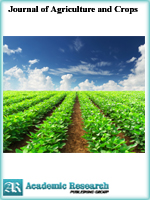Journal of Agriculture and Crops
Online ISSN: 2412-6381
Print ISSN: 2413-886X
Print ISSN: 2413-886X
Quarterly Published (4 Issues Per Year)

Archives
Volume 4 Number 5 May 2018
Technical Efficiency of Sorghum Production: The Case of Smallholder Farmers in Konso District, Southern Ethiopia
Authors: Kusse Haile ; Benyam Tadesse ; Jema Haji ; Bosena Tegegne
Pages: 50-62
Abstract
This study aims to analyze the technical efficiency of sorghum production by smallholder farmers in Konso district, Southern Ethiopia using cross sectional data collected from a sample of 124 sorghum producing households. Individual levels of technical efficiency scores were estimated using the Cobb-Douglas functional form, which was specified to estimate the stochastic production frontier. The estimated stochastic production frontier model indicated that input variables such as land size, fertilizer (Urea and DAP), human labour, oxen power and chemicals (herbicides or pesticides) found to be important factors in increasing the level of sorghum output in the study area. The result further revealed significant differences in technical efficiency among sorghum producers in the study area. The discrepancy ratio, which measures the relative deviation of output from the frontier level due to inefficiency, was about 90%. The estimated mean levels of technical efficiency of the sample households was about 69%, which shows existence of a possibility to increase the level of sorghum output by about 31% by efficient use of the existing resources. Among the household specific socio-economic and institutional factors hypothesized to affect the level of technical inefficiency, age, education level, family size, off/non-farm activities, extension contact, livestock holding, plots distance and soil fertility status were found to be significant in determining the level of technical inefficiency of sorghum production in the study area. Hence, emphasis should be given to improve the efficiency level of those less efficient households by adopting the practices of relatively efficient households in the study area. Beside this, policies and strategies of the government should be directed towards the above mentioned determinants.
The Observation of Agricultural Policy in Japan: A Case Survey in Tokyo
Authors: Patarapong Kroeksakul ; Pramuk Srichaiwong
Pages: 43-49
Abstract
The aims of the paper are to present a Japanese agricultural phenomenon and to describe the effect that perceptions of agricultural policy have had on agricultural phenomena. The methodology comprises a survey of famers’ agricultural practices (interviews with 40 key informants conducted from 8–18 May 2016 in Tokyo). The patterns of agriculture are 1) agricultural treatment, and 2) small farms that almost use Kasetpranit (elaborate agriculture). Moreover, Japan’s many policies and strategies regarding agriculture are focused on using partner countries and joint ventures to make products to support the Japanese people. However, Japan has a zone for agricultural production in which it is able to control the quality of agricultural production; in this good environment, Japan produces high-quality products. By applying Japanese agricultural concepts, other countries can improve their situations.



